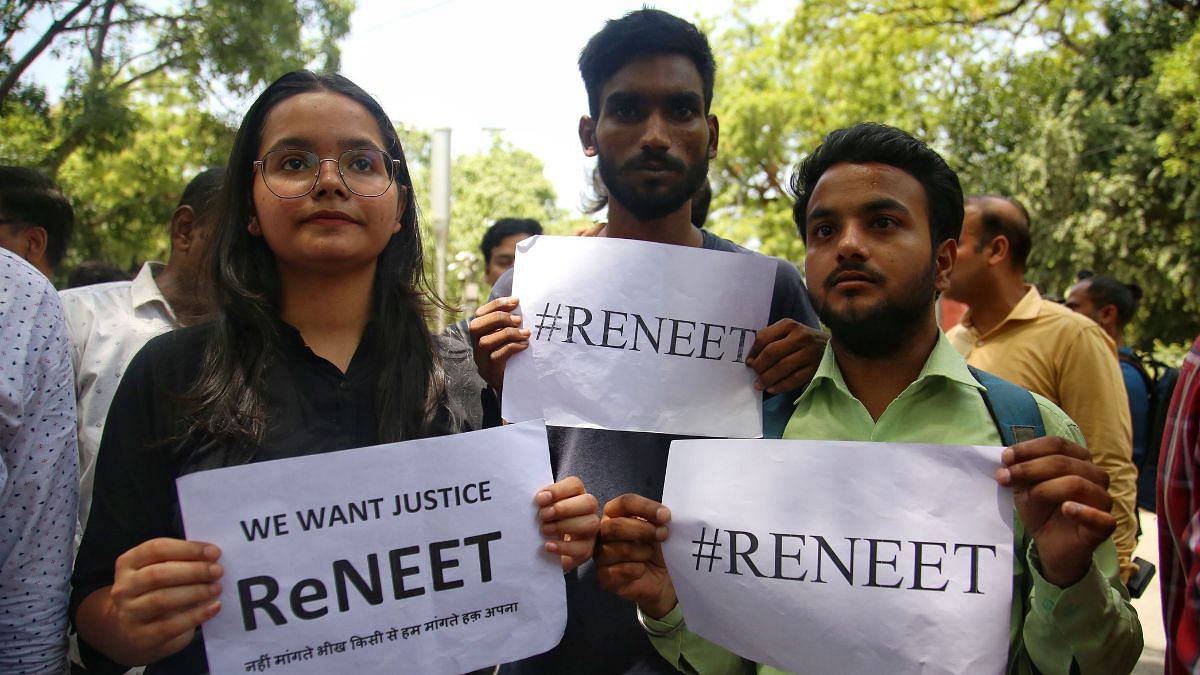New Delhi: Eight quarterly tests and two internships spread over classes 11 and 12 and a centralised entrance should replace exams such as National Eligibility cum Entrance Test (Undergraduate) or Joint Entrance Examination Main, two retired IAS officers, including former education secretary R. Subrahmanyan, and a former IIT director have suggested.
The team has proposed this alternative to the committee constituted by the Centre to look into the NEET irregularities and suggest exam reforms under the chairmanship of former Indian Space Research Organisation (ISRO) chairman K. Radhakrishnan.
Subrahmanyam, former IIT Jodhpur director Prem Kalra and retired IAS officer and former chairman of Coal India Limited Sutirtha Bhattacharya have suggested a continuous assessment system over a two-year period, giving weightage to three criteria. These include academic performance, social and professional aptitude, and an exit exam that tests overall knowledge.
“We propose that this weightage may be kept at 40:40:20 to ensure that the testing is wholesome,” the team has said in its proposal, termed the Continuous Assessment System for Admission (CASA).
According to them, the Continuous Assessment System for Admission will bring the “focus back on school education and school systems”. ThePrint has reviewed the contents of the proposal.
“This revised system has been proposed considering the crisis that emerged from repeated leaks in the conduct of major exams like NEET and NET (National Eligibility Test), and the resultant distress to lakhs of students,” the team has said in its proposal.
The government, the team has proposed, may apply the system to all high-priority examinations such as NEET, JEE, Common Admission Test, etc.
All the higher secondary schools in all districts in the country can conduct these tests. NEET now takes place only in 557 centres.
The state governments, the team has suggested, will identify the testing centres before 31 August each year.
Several attempts were made to contact Radhakrishnan over the phone, but he was not available to comment on the proposal.
Also read: NTA chief Subodh Kumar Singh removed amid uproar over NEET, UGC-NET controversies
How the 40:40:20 weightage will work
For the continuous academic assessment, the team suggested 40 percent weightage to eight quarterly academic assessments or mid-semester ones over two years — conducted online using standardised question banks.
Students should be able to take the tests on any of the days or pre-assigned weeks or Sundays to ensure that they do not miss out on classes due to the tests in their school, the team has suggested.
The team has proposed proctoring the online tests using Artificial Intelligence-based fraud detection systems.
Subhrahmanyam told ThePrint that the team has proposed giving the other 40 percent weightage to social and professional aptitude. The team has suggested doing this through two six-week internships at any of select institutes such as Indian Institutes of Technology, National Institutes of Technology, Indian Institute of Science, Indian Institutes of Science Education and Research or non-government organisations or industries connected with a subject of interest or study as a way to check the domain aptitude of the students.
Besides, there should also be mandatory National Service Scheme/National Cadet Corps programmes to check the social aptitude of the students.
The schools will evaluate and give marks to the students based on their handwritten reports about what they learned from their internships. For transparency, the school websites should display the marks as the National Testing Agency now does.
The team has also suggested zero payment to either party for the internships.
The third step will be a summative assessment with 20 percent weightage for the final NEET/JEE exam. This exam, Subhrahmanyam said, should be conducted online, at least twice a year, allowing the students to choose the best score for the final reckoning.
“Based on the marks obtained, a merit list can be generated. The tie-breaker should be the marks obtained in the summative assessment. However, it must be ensured that no student should be denied admission at the bottom of merit because of a tie-breaker. This can be done by creating supernumerary seats if needed,” the proposal has stated.
Also read: ‘Let us not be in denial’ — SC says NEET retest must happen if leak beneficiaries not identified
Timeframe for the exams
The former bureaucrats and the former IIT director have suggested the continuous assessment system can start from 2024-25. The first intake of candidates using this system could be in the 2026-27 admission season.
“Till it happens, the team has suggested that all exams may be conducted as Computer Based Tests (CBTs) using utmost cyber security protocols,” the proposal has said.
According to the proposal, the stakeholders in the revised system will be the state governments, the National Testing Agency, and educational institutes, which become permanent test centres. “Through this system, the academic, social and professional aptitudes will be assessed, resulting in a wholesome assessment system,” the proposal has said.
This will also strengthen the school boards because of greater participation of the schools in the assessment system. “Students will have the opportunity to explore the professions they are aspiring for. For example, the students aspiring for engineering can participate in tinkering labs, virtual labs, robotics, etc. The ICT (Information and communication technology) infrastructure in the school will contribute to such exploration,” the proposal has further stated.
(Edited by Madhurita Goswami)
Also read: Siddaramaiah govt yet to firm up education policy. ‘Disparity in 3- or 4-yr courses is confusing’

